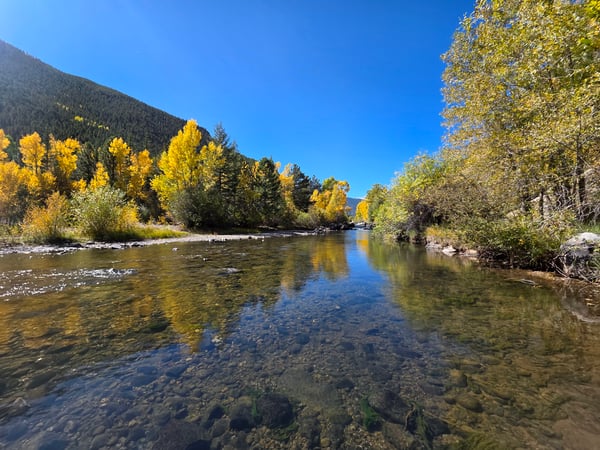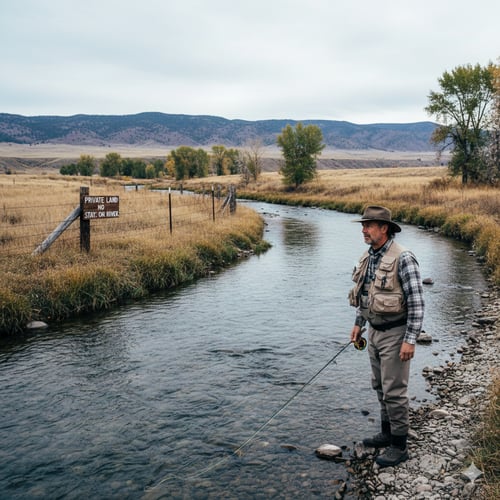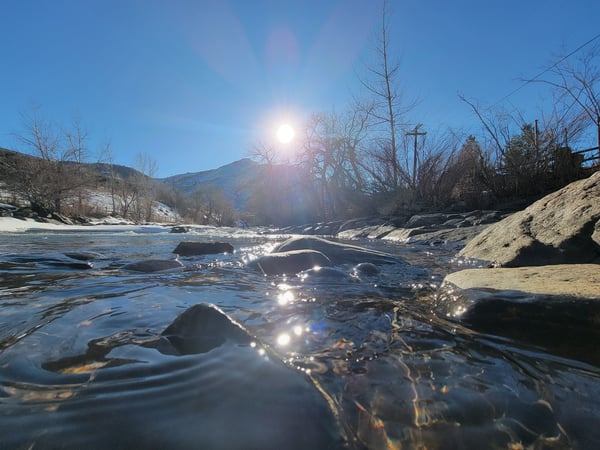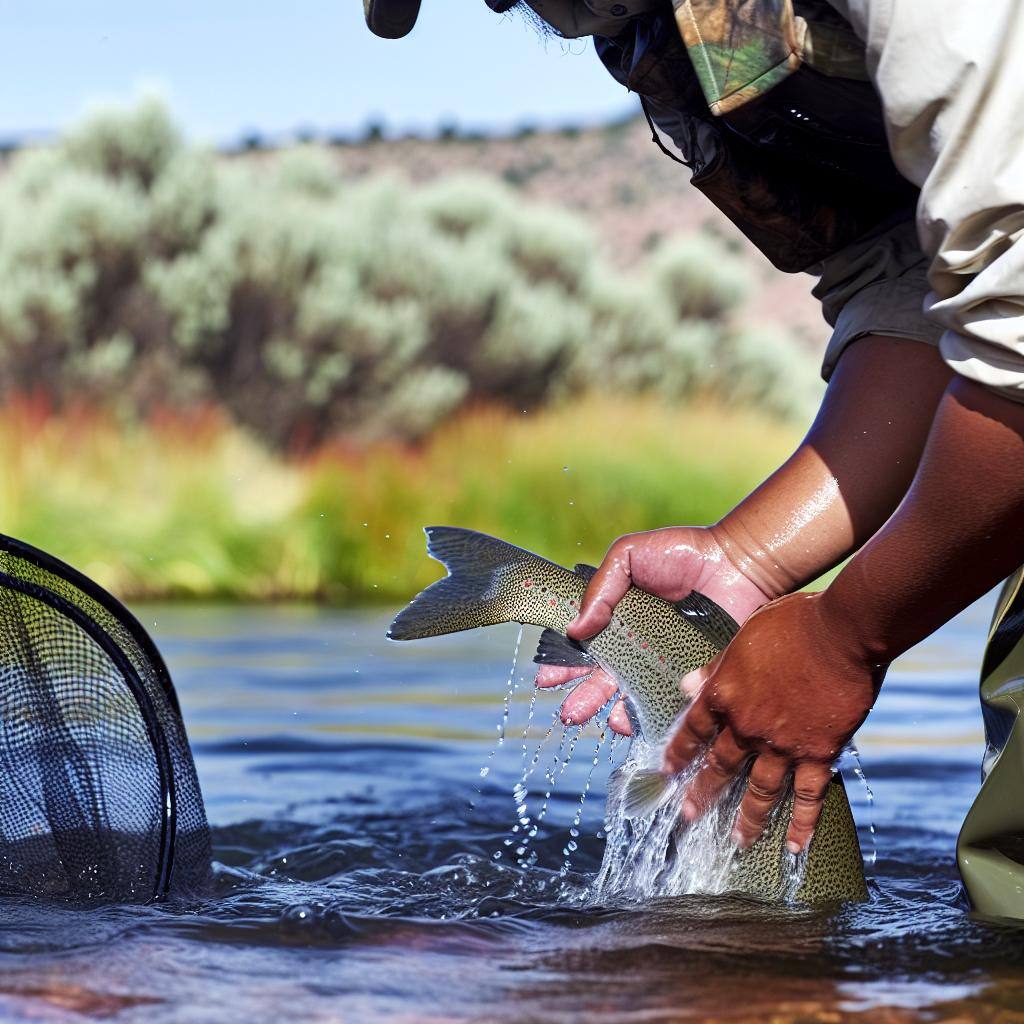This article is informational and not legal advice. When in doubt, contact Colorado Parks and Wildlife (CPW) or an attorney.
Listen to the Podcast!
Fishing Private Property in Colorado: What’s Legal, What’s Not, and How to Stay Out of Trouble
Fishing in Colorado often puts anglers face-to-face with one of the most confusing topics in the state’s outdoor laws: private property access. Rivers flow through ranches, fields, and backyards, but that does not mean anglers automatically have the right to fish them.
Understanding where fishing is legal and where it crosses the line can help you avoid citations, confrontations, and damaged relationships with landowners.
This guide breaks it down clearly and practically.

The Core Rule in Colorado
In Colorado, the landowner owns the streambed, not the public.
That single fact shapes nearly every fishing access rule in the state.
Even if a river is navigable and flowing, anglers do not have the right to touch the bottom, banks, or cross private land without permission unless there is a public easement or access point.
Can You Fish a River That Flows Through Private Property?
It depends on how you fish it.
Floating Through Private Property
Floating through private property is generally legal as long as you do not touch the streambed or banks. This includes:
- No anchoring
- No wading
- No stepping onto shore
- No pulling boats onto the bank
Any contact with the bottom or shoreline on private land can be considered trespassing.

Wading or Standing in the River
If the riverbed is privately owned, wading is not allowed without permission from the landowner.
This is where many anglers unknowingly violate the law.
Accessing the River
You must legally access the river from:
- Public land
- Designated public access points
- Public easements
- Bridges or right-of-ways where legal access is clearly defined
Crossing private land to reach water, even briefly, is trespassing.
Common Mistakes Anglers Make
Most violations are not intentional. They happen because anglers assume rules that apply in other states apply in Colorado.
Common mistakes include:
- Assuming all rivers are public once you are in the water
- Wading through private sections after floating in legally
- Stepping onto the bank to land a fish
- Parking or walking across private land near bridges
- Assuming “no posted signs” means access is allowed
In Colorado, permission matters more than signage.
How to Tell If You Are on Private Property
This is not always obvious, but here are practical tips:
- Use county parcel maps or onX style mapping tools
- Look for fencing, irrigation structures, or active ranch use
- Check CPW access maps and river access pages
- When in doubt, assume it is private
If you are unsure, it is better to move on than risk a citation.
Why Colorado Is Different From Other States
Some states allow public use of navigable waterways regardless of streambed ownership. Colorado does not.
The state has historically sided with landowners, which means anglers must be more cautious here than in places like Montana or Wyoming.
Understanding this difference prevents costly assumptions.
Best Practices for Fishing Near Private Land
If you want to fish responsibly and avoid conflict:
- Stick to clearly marked public access
- Float only when you can stay fully off the bottom
- Do not argue with landowners
- Respect fences and signage
- Ask permission when possible
- Support access programs and conservation groups
Good behavior today helps preserve access tomorrow.
What Happens If You Fish Private Property Illegally?
Consequences can include:
- Trespassing citations
- Fines
- Confiscation of gear
- Loss of fishing privileges
- Escalated confrontations with landowners
None of these are worth a few extra casts.
Final Thoughts
Colorado offers world-class fishing, but it also demands a higher level of awareness from anglers. Knowing where you can legally fish and how to do so responsibly protects you, the resource, and future access.
If you are unsure about a stretch of water, err on the side of caution and move on. There is always another public section worth fishing.
Other Resources
- Colorado Parks and Wildlife (CPW): The official website of CPW provides detailed information on fishing regulations, licensing, and access to waters in Colorado. It is an authoritative source for up-to-date rules and guidelines. You can visit their website at https://cpw.state.co.us/
- Colorado Fishing Regulations - eRegulations: The eRegulations website provides an online version of the Colorado Fishing Regulations. It offers a user-friendly interface for navigating the fishing regulations specific to Colorado. You can access it at https://www.eregulations.com/colorado/fishing-regulations
- Colorado Fishing Brochure: Colorado Parks and Wildlife publishes an annual fishing brochure that provides comprehensive information on fishing regulations and guidelines. It covers specific rules and regulations for fishing in Colorado, including seasons, bag limits, catch and release requirements, and gear restrictions. The brochure is in PDF format and can be found on the official CPW website: https://cpw.state.co.us/Documents/RulesRegs/Brochure/fishing.pdf
- Private Property Access: When fishing on private property, it is crucial to respect landowners' rights and seek permission before accessing or fishing on private lands. CPW guides on obtaining landowner consent and practicing ethical fishing on private properties. This information can be found on the official CPW website under their "Outdoor Recreation on Private Property" section: https://cpw.state.co.us/thingstodo/Pages/PropertiesPrivate.aspx
These sources should provide comprehensive and reliable information about fishing regulations and Colorado water access. Always check for updates and refer to the official sources Colorado Parks and Wildlife provides for the latest information.
ASK FIRST! DON'T TRESSPASS ON PRIVATE LAND
Sources:
We Are Not Attorneys (A Quick Note on Legal Advice)
We are anglers, not attorneys. This article is intended to help explain Colorado fishing access rules in practical, real-world terms based on publicly available information and common enforcement practices. It is not legal advice and should not be treated as a substitute for guidance from Colorado Parks and Wildlife or a qualified attorney.
Fishing access laws can change, interpretations can vary, and enforcement decisions are ultimately made on a case-by-case basis. If you have a specific legal question or are unsure about access on a particular stretch of water, the safest course of action is to contact Colorado Parks and Wildlife or obtain written permission from the landowner.
Our goal is simple: help anglers make informed, respectful decisions and avoid unnecessary conflict or citations while enjoying Colorado’s fisheries responsibly.
.png?width=300&height=100&name=Copy%20of%20Rise%20Beyond%20Logo%2012.31.24%20(300%20x%20100%20px).png)
.png)


.png)
-1.png)
